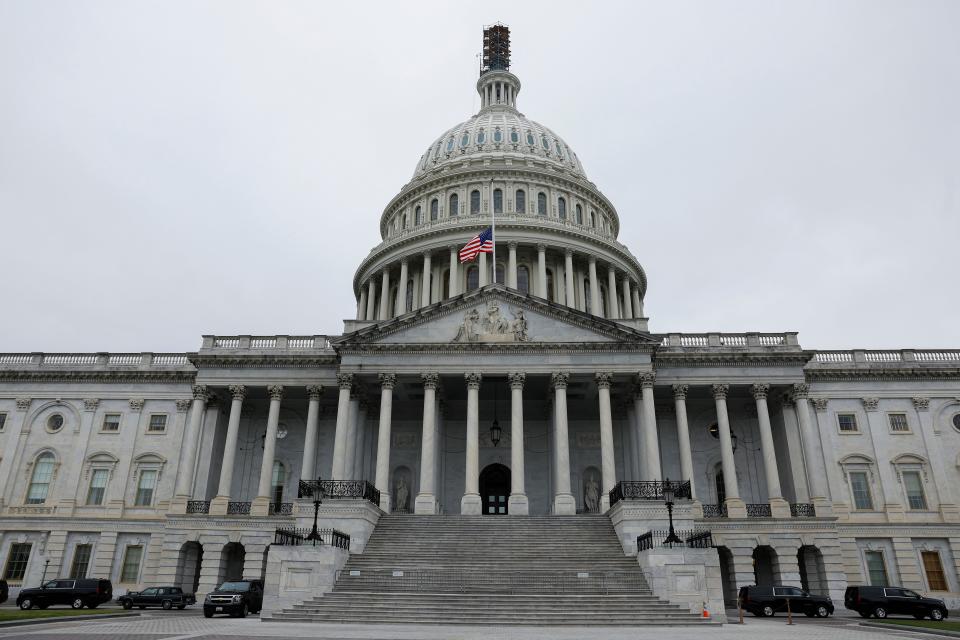The 11th hour: Congress needs a miracle to avert government shutdown
WASHINGTON − Time is running out.
Saturday is the last day Congress can move to avert a government shutdown before funding expires at 12:01 a.m. Oct. 1, and lawmakers are almost completely out of options.
The House yesterday failed to pass a continuing resolution, or temporary funding measure, that would extend government spending beyond the Oct. 1 deadline. The measure failed to pass after 21 Republicans, including a faction of the ultraconservative House Freedom Caucus, voted against it.
Republicans huddled late Friday afternoon in a closed-door conference meeting in what was a last-minute attempt by House Speaker Kevin McCarthy, R-Calif., to unite his conference behind a short-term spending measure.
“I think there’s a lot of frustration growing with the 21 individuals who chose to vote no on what was a very good plan,” Rep. Nicole Malliotakis, R-N.Y., told reporters following the conference meeting. “I’m very frustrated.”
In a display of how divided conservative hardliners are with the rest of the House GOP conference, most of the 21 members who voted against the measure did not attend the meeting, Rep. Greg Murphy, R-N.C., told reporters.
As time is quickly dwindling for both chambers, a stopgap measure is the only way for lawmakers to avert a shutdown.
Frustration grows among House Republicans

Rep. Mike Garcia, R-Calif., said Friday afternoon he was disappointed the continuing resolution failed in the House and is frustrated that 21 of his Republican colleagues thwarted its passage.
“The bottom line is that the (continuing resolution) would have kept the lights on,” he told USA TODAY. “It would have helped us secure the border, it would have helped us put a package together to actually cut spending for the first time in congressional history.”
He called the stopgap measure a “security blanket” that would allow negotiations on spending to continue.
“It's irrational behavior,” he said of those who voted against it.
Rep. Dan Crenshaw, R-Texas, shared similar feelings of frustration, telling reporters Friday the 21 Republicans who voted against the continuing resolution prevented advancement of the most conservative temporary spending bill that has come to the table.
He said he now thinks House Republicans have lost any opportunity to gain leverage against Democrats and will have to compromise on a spending bill that has more liberal priorities with the exclusion of border security provisions.
“Because of these 21 who have killed the conservative stopgap measure., the most likely scenario is more liberal spending that most of us won't support but enough will support to pass,” Crenshaw said. “These people caused a more liberal spending bill to happen.”
GOP fights for votes on single-spending bills

Rep. Matt Gaetz, R-Fla., a conservative hardliner who voted against the stop-gap measure and often aligns with members of the House Freedom Caucus, said the lower chamber has proven they are capable of passing single spending bills, referring to House Republicans successfully passing three out of 12 appropriation bills Thursday night. The trio of bills have no chance of getting through the Democratic-controlled Senate.
“The House has also proven that it cannot pass a continuing resolution that reverts back to the old ways of Washington,” he told reporters Friday.
To Gaetz, there’s a clear path forward: Schedule votes on single-subject spending bills.
“We can pass them. House conservatives did vote for them last night and if we do that, we can get a vast majority of this government funded without any interruption and then minimize any disruption as a consequence of any partial shutdown,” Gaetz said.
House Freedom Caucus member Byron Donalds, R-Fla., said he has not lost sight of the 12 appropriations bills that he wants passed individually to cut federal spending.
“At the end of the day, the fiscal health of the nation is in shambles and inflation is hurting our people regardless of their politics so you have to come out of this entire experience cutting spending and securing the nation’s border,” Donalds said.
Some of the conservative hardliners, like Rep. Matt Rosendale, R-Mont., another Freedom Caucus Member, said they’re willing to bear the brunt of a government shutdown if it means they can pass the 12 appropriation bills without having to approve a continuing resolution. Rosendale downplayed the effects of a shutdown to USA TODAY and instead referred to it as a “government slowdown.”
A two-week stop-gap measure?

House Republicans emerging from a closed-door meeting Friday told reporters various options were discussed from a 48-hour stopgap measure to a 45-day long continuing resolution. Most GOP lawmakers expressed support for a two-week measure but it is unclear what short-term legislation can pass through the Democratic-controlled Senate.
“We’re all over the map in duration. Some people want to put what we just did back on the floor. Others want 14 days, some just say seven days. So we’re all over the place,” Rep. Steve Womack, R-Ark., told reporters Friday.
Rep. Bob Good, R-Va., a Freedom Caucus member, walking out of the conference meeting, expressed irritation and told reporters it “did not go well” and that he personally was pushing for a week-long stopgap, but the options presented in the meeting he thought, were “worse than the (continuing resolution) that was on the floor Friday.”
The Senate is set to vote Saturday on their version of a continuing resolution that is tied to the Federal Aviation Reauthorization Act. Their stopgap measure extends funding through Nov. 17.
But Sen. Ron Johnson, R-Wis., proposed his own solution to averting the shutdown on the Senate floor Friday afternoon introducing a 14-day continuing resolution with no policies attached. Sen. Patty Murray, D-Wash., who chairs the Senate Appropriations Committee and played a key role in putting together the Senate’s current continuing resolution, objected to Johnson’s legislation.
Coming out of the House GOP conference meeting Friday, Womack, while he still held out hope his colleagues could come to a consensus, told reporters that Congress is virtually out of time.
“I think it’s pretty safe to say that tomorrow at midnight, the lights are going to go out for a while.”
This article originally appeared on USA TODAY: The 11th hour: Congress needs a miracle to avert government shutdown

